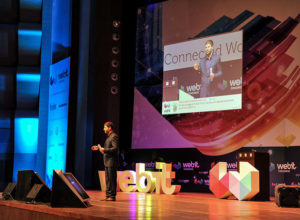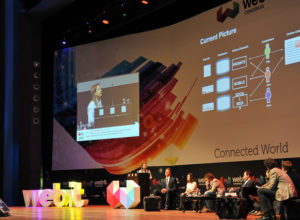Tag: Data
Finding the right balance between privacy and security online
The era of omnipresent Internet is said to bring 24 billion IoT devices, as well as $1 trillion spent on cyber security from 2017 to 2021.
As we take a look at what happens in the global landscape, we can clearly see that what matters the most, is information. What is the most expensive, and not just in terms of business, is data. It’s no surprise, then, that preventing the stealth and uncontrolled usage of those plays uprising role in the era.
Experts predict that this year we will see huge leaps in terms of cyber security. Within the next years, companies will more and more rely on software solutions, ensuring automation of privacy. Also, business decisions will be more informed and backed on freely accessible, but accurate and protected data. Realizing the importance of data protection, global regulatory bodies promised a new privacy regulation to be developed and implemented in 2017, too.
The world may spend undisclosed amount of money on things that just don’t matter, but cyber security isn’t one in that row. And while business solutions are much more expertise and any other sources requiring, individual decisions are much easier to start with. If you could be your own cyber security advisor, what would you do to make secure yourself, as an individual first?
Basic rules you could follow to make sure you’re cyber-protected, are to use different email accounts for usual communication and for sensitive information, to not click on any flashing links of suspicious emails in your inbox, to choose wisely the passwords you use, to make sure the kids use different computer to download games, to watch out what you download and open on your smartphone.
When talking about cyber security, a key fact we all need to understand sooner or later, is that personal data is the price we pay for enjoying a huge amount of internet and mobile features. Underestimating its value and giving it away, knowingly or not, is definitely not the best thing you can do for yourself.
Would you let this app to access your location, files, Wi-Fi connection and calls log? To access this website, you should first read and accept the terms and conditions. We know you want to keep it, but would you share your privacy with us by just clicking here?
This is a small part of the questions you’ll be asked in order to register on a website or a mobile app. And most of us would instantly respond “Yes” without even reading. The privacy policies of the websites explain how gathered data will be used - selling, targeting, development of new tools and apps. But truth is, no one reads them carefully, as the websites usually want us to do.
In our connected world, conscientious and strategic steps to ensure cyber security are needed both by customers and by businesses. While for most of the companies IT departments were in charge of it so far, cyber security is a matter of business, not of IT solutions.
To learn more on the topic of cyber security and privacy, visit the Security & Privacy Summit within Webit.Festival Europe. During 25 and 26th April 2017 in Sofia top level speakers from all over the world will share their experience. You can listen to Ulrich Seldeslachts, CEO of LSEC-Leaders In Security; Raj Samani, CTO EMEA of Intel Security and Rami Essaid, Co-Founder of Distil Network.
Digital revolution – transformation of the business
We have all seen how the technological advances change the world around us by the day. They have change the way we live, the way we communicate with others, the way we organize our lives. And they are rapidly changing the way the businesses work.
The introduction of new technology has led to not just changes in the existing businesses, but also to the creation and development of whole new fields like outsourcing. By making ideas more easily shareable than ever it has become simple to find like-minded people and create a startup together. This, combined with the power on the Internet has led to the creation of giants like Facebook, but has also allowed small business like WhatsApp to grow immensely over the course of a few years.
Technology has affected the business in many ways, both directly and indirectly. On one hand, it has become easier for business to find new talent and build a lasting relationship with their customers with the power of social networks. On the other hand, it has become easier for customers to find a new company that can give them more value for their money, which has forced big companies to try and find new ways to satisfy their customers.
One of the biggest changes we have seen in the recent years has been the development and popularizing of “loyalty programs”. While they look innocent and like a small change, programs like Tesco Clubcard or Wizzair’s Wizzclub have greatly affected the way people spend their money. By becoming a part of the club you are not only accepting the rewards it gives, but you are accepting the responsibility to keep giving your money to this company and not any other. The loyalty programs have also enabled companies to collect big data about their customers – what is the demographic, how much do people spend on average, what are their habits. By finding an answer to all these questions, a company can greatly improve the service it provides, which leads to more people joining the program, which leads to more data and so on.
Technical advances have been affecting the business world ever since the invention of the steam engine. However, it has only been in the recent decades, with the invention of the Internet that we have seen a skyrocket of the impact technology has on every industry. No one can imagine building a company nowadays without having an IT department, or at least and IT guy. In the foreseeable future technology will keep increasing its impact on every area of our lives and on every area of our businesses.
Big cloud, big data, big challenge
It’s human nature to strive for big, for grandiosity, `the bigger, the better`, they say. With the infinite quantity of information we have today, everything around us is big. Big data, big cloud as well as big challenges along with them. Where do these challenges come from you will ask?
As it has been stated above, nowadays we want everything to be big, so it is. Big data refers to the ever-increasing volume, velocity, variety, variability and complexity of information. But why challenges should be also big? Because there is one and only thing which is not big enough, it is even small, insignificant. This is the control we have over this endless quantity of information. We still do not know what to do with the big data, how to analyze it, to take advantage of it, to use it anyway at all. The problem is not how big the data is, but what do you want to know from it. Once you clarify this to you, you have the right answer.
Big data is the logical consequence of the digital era we live in and the logical consequence of big data is big cloud. Information should be stored somewhere and here comes big cloud. Convenient, more or less secure, satisfactory decision.
The influence of all these big stuff on marketing cannot be anything else but also big. It refers to the decision-making process, analysing, media planning, etc. It is important for marketing experts to know what data to gather, which analytical tool to use and how to go from data to insight to impact. It won’t be easy, but have in mind that you shouldn’t try to save the world. At least not at first.
CEEDS`15 by Webit is where you will learn much about big data, big challenges and most importantly - how to cope with them. Hurry up and buy your tickets with early bird prices of 100 EUR.
Big Data for retailers and competitive intelligence
Competitor intelligence is a specific type of market intelligence. As a result, a good quality provider of market intelligence should offer competitor intelligence as part of its range of services.
According to the definition, we found in Wikipedia, competitive intelligence as:
‘The action of defining, gathering, analyzing, and distributing intelligence about products, customers, competitors, and any aspect of the environment needed to support executives and managers making strategic decisions for an organization’.Literally, it means to know what is going outside of your business, in order for you and your products to be competitive and relevant to the market. It is inevitable when talking about retailers and competitive intelligence, not to talk about big data. And it is not just big, but it gets bigger every single day. The question here is if retailers could control the data gathering and how to manage the whole process. The truth is that there is more information available to the business than ever before. However, information that can really help a business make decisions is scarce and valuable. So you should pick and gather preferably. It is extremely difficult to measure the ROI of market intelligence, respectively of customer intelligence; nevertheless, it is clear that the price of projects broadly reflect the potential benefits. The most expensive studies are market entry intelligence studies, on the basis of which huge investments are often made (or avoided). 10 days left till the 6th Global Webit Congress in Turkey. Our speakers have prepared plenty of good practices for you, so book your tickets now!
Webit speakers: Aurelie Pols, Digital Analytics
Meet Aurélie Pols, Webit Speaker, Chief Visionary Officer & Founder of Mind Your Group. She will be joining us at the blue track of the Global Webit Congress.
Aurélie has extensive background and experience in Digital Analytics. She pioneered Digital analytics in Europe by stating vendor independence and focusing on the interaction of tools and data to support business strategies.This allowed her to co-found OX2 in Belgium in 2003, which was successfully sold to UK based Digitas LBi (Publicis) in 2008.
In 2012 she co-founds Mind Your Group in Spain addressing issues revolving around digital analytics, including Social Media and Privacy.
Dedicated to analytics since 2001, she is listed in Avinash Kaushik’s top 10 analytics blogs. She is Web Analytics Demystified’s initial principal consultant for US based web analytics guru, Eric T. Peterson.
 Of International background she was Globalization Chair for the Digital Analytics Association (DAA) and serves on the Board of Stockholm’s eMetrics Marketing Optimization Summit.
Today she speaks at various events such as eMetrics, O'Reilly's Strata and the IAPP, The International Association of Privacy Professionals.
After a decade of gathering technical knowledge about the use of analytics tools through a range of certifications, she focuses on delivering value to the bottom line with keeping an eye on data protection legislation, pushing a Privacy by Design agenda.
Her main focus, besides coaching analysts and data officers, are data integrations and vizualizations; digital analytics teams with their HR set-up & Privacy within the context of Big Data.
She will be presenting her experience and knowledge at the blue track of the Global Webit Summit. The topic that she will be presenting is: "Assessing Risks in the Cloud to fuel Big Data Initiatives".
Join the discussion at the 6th Global Webit Congress in Istanbul. Come join Aurelle Polls and over 200 distinguished speakers at the Global Webit Congress. Book your ticket now.
Of International background she was Globalization Chair for the Digital Analytics Association (DAA) and serves on the Board of Stockholm’s eMetrics Marketing Optimization Summit.
Today she speaks at various events such as eMetrics, O'Reilly's Strata and the IAPP, The International Association of Privacy Professionals.
After a decade of gathering technical knowledge about the use of analytics tools through a range of certifications, she focuses on delivering value to the bottom line with keeping an eye on data protection legislation, pushing a Privacy by Design agenda.
Her main focus, besides coaching analysts and data officers, are data integrations and vizualizations; digital analytics teams with their HR set-up & Privacy within the context of Big Data.
She will be presenting her experience and knowledge at the blue track of the Global Webit Summit. The topic that she will be presenting is: "Assessing Risks in the Cloud to fuel Big Data Initiatives".
Join the discussion at the 6th Global Webit Congress in Istanbul. Come join Aurelle Polls and over 200 distinguished speakers at the Global Webit Congress. Book your ticket now.
 Of International background she was Globalization Chair for the Digital Analytics Association (DAA) and serves on the Board of Stockholm’s eMetrics Marketing Optimization Summit.
Today she speaks at various events such as eMetrics, O'Reilly's Strata and the IAPP, The International Association of Privacy Professionals.
After a decade of gathering technical knowledge about the use of analytics tools through a range of certifications, she focuses on delivering value to the bottom line with keeping an eye on data protection legislation, pushing a Privacy by Design agenda.
Her main focus, besides coaching analysts and data officers, are data integrations and vizualizations; digital analytics teams with their HR set-up & Privacy within the context of Big Data.
She will be presenting her experience and knowledge at the blue track of the Global Webit Summit. The topic that she will be presenting is: "Assessing Risks in the Cloud to fuel Big Data Initiatives".
Join the discussion at the 6th Global Webit Congress in Istanbul. Come join Aurelle Polls and over 200 distinguished speakers at the Global Webit Congress. Book your ticket now.
Of International background she was Globalization Chair for the Digital Analytics Association (DAA) and serves on the Board of Stockholm’s eMetrics Marketing Optimization Summit.
Today she speaks at various events such as eMetrics, O'Reilly's Strata and the IAPP, The International Association of Privacy Professionals.
After a decade of gathering technical knowledge about the use of analytics tools through a range of certifications, she focuses on delivering value to the bottom line with keeping an eye on data protection legislation, pushing a Privacy by Design agenda.
Her main focus, besides coaching analysts and data officers, are data integrations and vizualizations; digital analytics teams with their HR set-up & Privacy within the context of Big Data.
She will be presenting her experience and knowledge at the blue track of the Global Webit Summit. The topic that she will be presenting is: "Assessing Risks in the Cloud to fuel Big Data Initiatives".
Join the discussion at the 6th Global Webit Congress in Istanbul. Come join Aurelle Polls and over 200 distinguished speakers at the Global Webit Congress. Book your ticket now. Big Data, Big Cloud and Big Risks
Initially the trend was about processing the Big Data inputs to render helpful insights. Storing enormous data from various sources in the Big Cloud is rewarding and cost effective. At the same time, it creates Big Risks of cyber attacks for businesses.
Big Data 1.0 was about processing massive data inputs to render insights. The next wave is about stitching data together, putting it to work while taking advantage of SaaS cloud solutions.
Big Cloud can be an outstanding way for cost-effectively deliver enormous value to businesses, using employee and customer data.
Big Risk are associated with data breaches dominating the headlines lately. It is vital that companies protect their information, while respecting compliance requirements.
The Big Cloud session of the blue track at the Global Webit Summit will explore future trends and topics related to Big Data, the Big Cloud and associated Big Risks for businesses.
Aurelie Pols, Chief Visionary Officer at Mind Your Group, and many other distinguished speakers at the blue track of the Global Webit Congress will present their experience and advice that can be useful to industries cope with risk assessments, technical planning and ongoing training to hedge against new cyber risks.
Join the discussion at the 6th Global Webit Congress in Istanbul. Book your tickets now!
Internal Data Science and the Hypercomputing Future
The great majority of scientific research rely heavily on our ability to extract value out of data. Challenging the way we capture, store and process data is fundamental for our ability to fully capitalize on the promise of data.
Currently this “internal” aspect of data science is largely neglected, and receives only little attention or funding in academia or commerce.
At the blue track of the Global Webit Congress, we realize that Big Data, Big Cloud and real time data analytix are trends of the future.
That is why the speakers at the blue track of the Global Webit Congress together with 400 investors, 300 accredited media and thousands of C-level attendees will discuss such hot future topics as:
- Internal Data Science: The mythical art of high performance computing…is it alchemy?
- Brand New Computing: How to increase computational output 1000 times without spending more
- Hypercomputing: What is it and why don’t we have it already?
The Future of Cloud Computing and Big Data in Healthcare
In a fast changing connected world, healthcare as we know it is changing fast. Our everyday life styles and health habits are changing also thanks to the new possibilities offered by technological advances in Big Data and Cloud Computing.
Together with Tech leaders, influential Founders, CTOs, CIOs of the world’s most innovative companies, disruptive start ups, top talents, and over 400 investors and 300 accredited media we will discuss these Future trends in healthcare at the blue track of the Global Webit Congress.
Cloud Computing and Healthcare
In a widely connected Internet of Things (IoT) world, that is becoming predominantly mobile, the current trend is to collect and store information in the Cloud. Cloud Computing allows fast access to the stored data in real time from anywhere. Businesses are increasingly moving toward cloud software services that cost less and are easier to manage. In Healthcare, digital records are stored and managed in the cloud. Healthcare indicators like heart rate, blood pressure, glucose levels are collected and sent to the cloud via wearable devices. Physicians are uploading information about their patients and sharing it with their colleagues. The critical information uploaded in the cloud is analyzed for better outcomes and access of the data. Companies like Salesforce, SAP SE, IBM and Oracle Corp among others, are investing in software and solutions targeted at specific sectors such as healthcare to boost growth.
Big Data and Healthcare
All this Big Data accumulated in the cloud can improve patient outcomes. Using new technologies Big Data is processed and analyzed to identify new trends and solutions that would otherwise be invisible or hard to track. Hospitals can now identify in real time the occurrence of patients with a highly contagious illness. Physicians can examine the information gathered from a patient and identify trends in treatment using data from a pool of other patients stored in the cloud again in real time. Using a desktop PC or an iPad, Android or Windows mobile device they can get to and manage this data from anywhere. Previously undiscovered negative drug interactions could be identified almost immediately using big data. The future possibilities of analyzing and making useful Big Data in healthcare are promising.
Combining Cloud Computing and Big Data will lead to fantastic increases in efficiency and improved patient outcomes.
At the blue track of the Global Webit Congress, we will be discussing the interconnection of Big Data, Cloud Computing and Health Care.
Join in the discussion by applying for an early bird ticket
The Future of Big Data, Big Cloud and Connected Devices
We are living in a constantly changing, complex, interconnected world. We are seeing all kinds of connected devices all around us both at home and at the enterprise. All these connected devices create enormous amount of data, Big Data. The great challenge facing us is what to do with it. How to make it useful.
At the blue track of the Global Webit Congress we are presenting speakers from leading companies that will discuss trending topics like Big Data, Big Cloud, Connected Devices and IoT.








